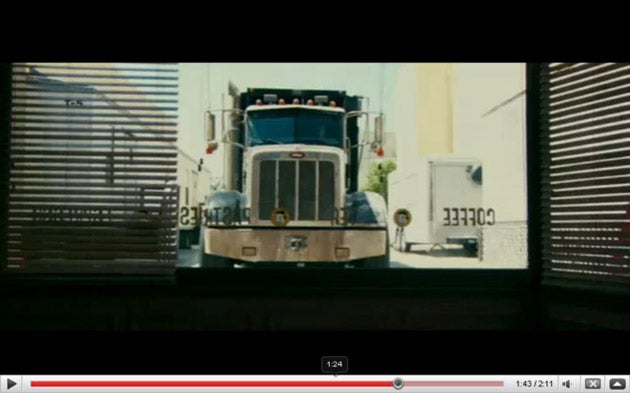Tom Sutcliffe: 3D movies are all an illusion

Possibly the greatest 3D effect in cinema history dates from 1895 – the year that the Lumière brothers first started showing their short "actualités" to the French public and the year in which "Train arrival in the station of La Ciotat" – a simple fixed shot of a steam train pulling into a provincial station – reportedly had audiences flinching backwards in their seats in alarm. What the Lumière brothers had inadvertently demonstrated is that cinema was – from its very inception – a three-dimensional art form, one in which you can never guarantee that an image will stay inertly fixed to the sheet on which it is projected. Mere tricks of perspective are the very least of it too, because within a matter of years other film-makers had demonstrated that infinitely more potent things could be made to jut from the picture plane and touch an audience that might have assumed that it was looking on from a safe distance. The train only looked as if it was about to roll into our space. But human sympathy and desire and sorrow really did cross the gap between screen and auditorium and hit the audience where they could feel it.
It's never been enough for some film-makers, and as if to recreate the primal intensity of that first encounter between pure film and an as yet unjaded audience, there have been repeated attempts to develop an optical 3D effect which might match the conceptual one that came for free. Sometimes this was in response to external threat – such as the boom in 3D productions which was stimulated by the arrival of television in the US. Sometimes it was a desperate attempt to give a marketable edge to an otherwise undistinguished B-movie. But it was never exactly reputable or mainstream.
It's possible that that's about to change, though. James Cameron would like you to think so – unveiling teaser clips of his forthcoming 3D science blockbuster Avatar with the suggestion that the projection technology had finally caught up with the film-makers' ambitions. Pixar's forthcoming animation Up was the first 3D film ever to open the Cannes Festival, and if the sniffiest of all cineastes are getting less sniffy, its surely a straw in the wind.
Check out the trailer for The Final Destination before you get too excited, though. A 3D addition to a ghoulish franchise in which Death claims those who have skipped an earlier engagement with him, The Final Destination suddenly seems unusually preoccupied with quietus, which comes in the form of projectiles whizzing at speed directly towards the camera lens. Suddenly, Death has lost his flair, it seems, or been obliged to curb his imagination to meet the thuddingly literal demands of 3D, which can never quite forget the need for self-advertisement. The problem with 3D, in short, is that it is obsessively one-dimensional... endlessly concerned with the least interesting angle in cinema: the head on assault.
The new wave of 3D films may rewrite that dismal rule, but I suspect they'll only be any good if their virtues survive two-dimensional projection. No matter how good the technology is, a film that wants to poke you in the eye (or deceive it) is never going to match the film that manages to jab you in the mind (and stimulate it). I forget which classic era director it was who, when told by an excited colleague about the latest developments in 3D, replied mordantly that it would make more sense if Hollywood tried for two dimensions first. But whoever it was, he was right.
Wonderful prospect
I've always thought of Alice's Adventures in Wonderland as an essentially unadaptable text – in part because it has the plotlessness of a dream. It's just a string of brilliant hallucinations with no internal clock to urge things forward, so it often suffers when transferred to the stage or screen. The best an adapter can really do is illustrate it with sufficient brilliance to make you forget John Tenniel. Which means that the prospect of Tim Burton's Alice in Wonderland is genuinely intriguing – since he is an illustrator of genius. The pictures of his partner, Helena Bonham Carter, as the Red Queen are very promising – a deranged transformation of Gloriana – with a radar dome of a forehead rising up above Betty Boop eyes and an oddly sinister little heart-shaped mouth. It's as if you'd dozed off mid-spliff while watching Glenda Jackson in Elizabeth I and it suggests that – whether or not he can make the thing less of a carnival parade than most adaptations – the floats will at least be worth looking at as they pass.
* What would have happened to Occupation, I wonder, if Peter Bowker's terrific Iraq drama had been going out this week rather than last? Over the weekend, a senior executive would have read the news that two British hostages' bodies had just been handed over in Baghdad and realised – with a sinking stomach – that the second episode of Occupation ended with a powerful sequence in which a civilian military contractor is kidnapped by insurgents and prepared for execution. Urgent telephone calls would have been made, emergency compliance meetings scheduled and – I'm only guessing from previous history here – a reluctant decision made that it might appear insensitive to broadcast such a fiction so hard on the heels of that revelation. It's an odd situation, really – almost a catch-22. The time that it is often most difficult to show serious, unflinching drama about life-and-death issues is very often the precise moment at which it would be most pertinent to the audience – because the real world has suddenly confirmed that it's not just make-believe.

Join our commenting forum
Join thought-provoking conversations, follow other Independent readers and see their replies